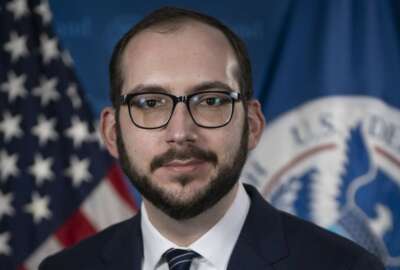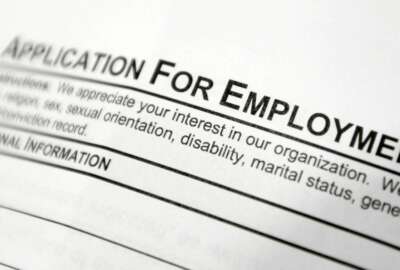State Dept streamlines HR processes after hiring pilot exceeds expectations
The State Department is one of the latest agencies to launch a Subject-Matter Expert Qualification Assessment (SME-QA) pilot, this time focused on hiring grant...
Best listening experience is on Chrome, Firefox or Safari. Subscribe to Federal Drive’s daily audio interviews on Apple Podcasts or PodcastOne.
The State Department is bringing new talent onboard through a hiring process that’s gaining momentum across government.
The State Department is one of the latest agencies to launch a Subject-Matter Expert Qualification Assessment (SME-QA) pilot, this time focused on hiring grant management specialists and foreign affairs officers.
The U.S. Digital Service developed the SME-QA process to help agencies assess applicants’ qualifications for technical positions. The process has agencies bring in current employees who are experts in a given field to help the human capital office vet and hire candidates.
Kristen Fulcher, an HR specialist in the Bureau of Global Talent Management’s Office of Civil Service Talent Management, led the SME-QA pilots. She said the SME-QA process is meant to address some of the biggest hurdles in the federal hiring process.
Recent data from the General Services Administration shows 90% of competitive job posts open to the public relied solely on the applicant’s answers to a self-assessment questionnaire to determine if their experience made them eligible for a position.
“The self-assessment approach leaves a little bit of room for applicants to inflate their skill level, which then could lead to referring candidates to hiring managers who may not necessarily meet the qualifying criteria,” Fulcher said in an interview last month.
The State Department launched its SME-QA pilot to hire grants management specialists at the GS-12 level and GS-13 Foreign Affairs Officers.
By the end of the pilot, the State Department made more than 70 new hires through one hiring action.
State Department human capital officials said the pilot far exceeded expectations, and helped the agency rethink how it hires new employees across its civil service ranks.
USDS has worked with several agencies on hiring pilots.
It partnered with the Office of Personnel Management and the Chief Data Officers Council last year to launch a SME-QA pilot to hire data scientists across multiple agencies.
OPM received more than 500 job applications in less than two days.
Agencies, meanwhile, on comparing notes on the success of their pilots.
Following the State Department’s pilot, OPM and the Office of Management and Budget launched a SME-QA community of practice in January.
“Federal executive agencies have been getting together on a regular basis to share their assessment methodologies and other best practices,” Fulcher said.
Kim Bruner, the director of the Bureau Global Talent Management’s Office of Civil Service Talent Management, said the agency in 2019 was largely relying on internal recruitment to fill vacancies.
Bruner said the agency saw other agencies capturing a high volume of quality candidates through the SME-QA process, and saw the pilot as an opportunity to help fill vacant positions.
“Above all, we are committed to utilizing lessons learned from the assessments used in this SMEQA process, as we work towards moving away from solely using self-assessment questionnaires,” Bruner said.
The SMEQA process puts candidates through multiple stages of review to determine their experience and skill level. Subject matter experts also work with the agency’s human capital offices to conduct those reviews.
The agency brought in employees who have held those positions, or are at a higher grade level to serve as the subject-matter experts for the pilot.
To help increase the diversity and quality of the applicant pool, State developed a strategic recruitment plan for each stage of the pilot. The agency also reached out to industry and professional organizations and sent automatic notices to diversity and affinity groups through its talent acquisition system.
Following resume reviews and structured phone interviews, the State Department developed a certificate of highly qualified candidates, which is a pool of the candidates deemed most qualified.
“We marketed them to hiring managers across the department to really drive up our selection count from each certificate to make this process worthwhile,” Fulcher said.
Fulcher said it takes more time to prepare an SME-QA hiring announcement than a traditional federal recruitment action, but the agency under the SME-QA pilot was able to hire multiple employees through one hiring action.
At the time of the pilot, one hiring announcement would usually yield one or two hires, and all the remaining qualified candidates could not be further considered for additional vacancies beyond 60 days.
“At that time, the hiring manager would have to recruit all over again to fill a similar vacancy in hopes that qualified candidates would apply or reapply to a brand new announcement that they would need to post,” Fulcher said.
However, Fulcher said her team shared these SME-QA certificates with more than 70 hiring managers. The agency also modified its internal policy to allow all certificates to remain available for sharing for a full 240 days instead of the 60 days that was previously allowed.
“We cut down time to hire on the back-end of the process, because we were able just to go ahead and start sharing the certificate to a hiring manager so that we didn’t have to start from scratch and post an announcement,” Fulcher said.
Based on the success of the pilot, the State Department stood up a new centralized shared certificate team focused on regularly announcing positions for high-volume vacancies that managers can recruit from at department-wide scale.
“Our goal is to really make sure hiring managers consider candidates from shared certificates first before posting a brand new announcement for similar vacancies. So we’re really trying to increase our efficiency through this method,” Fulcher said.
Copyright © 2025 Federal News Network. All rights reserved. This website is not intended for users located within the European Economic Area.
Jory Heckman is a reporter at Federal News Network covering U.S. Postal Service, IRS, big data and technology issues.
Follow @jheckmanWFED






